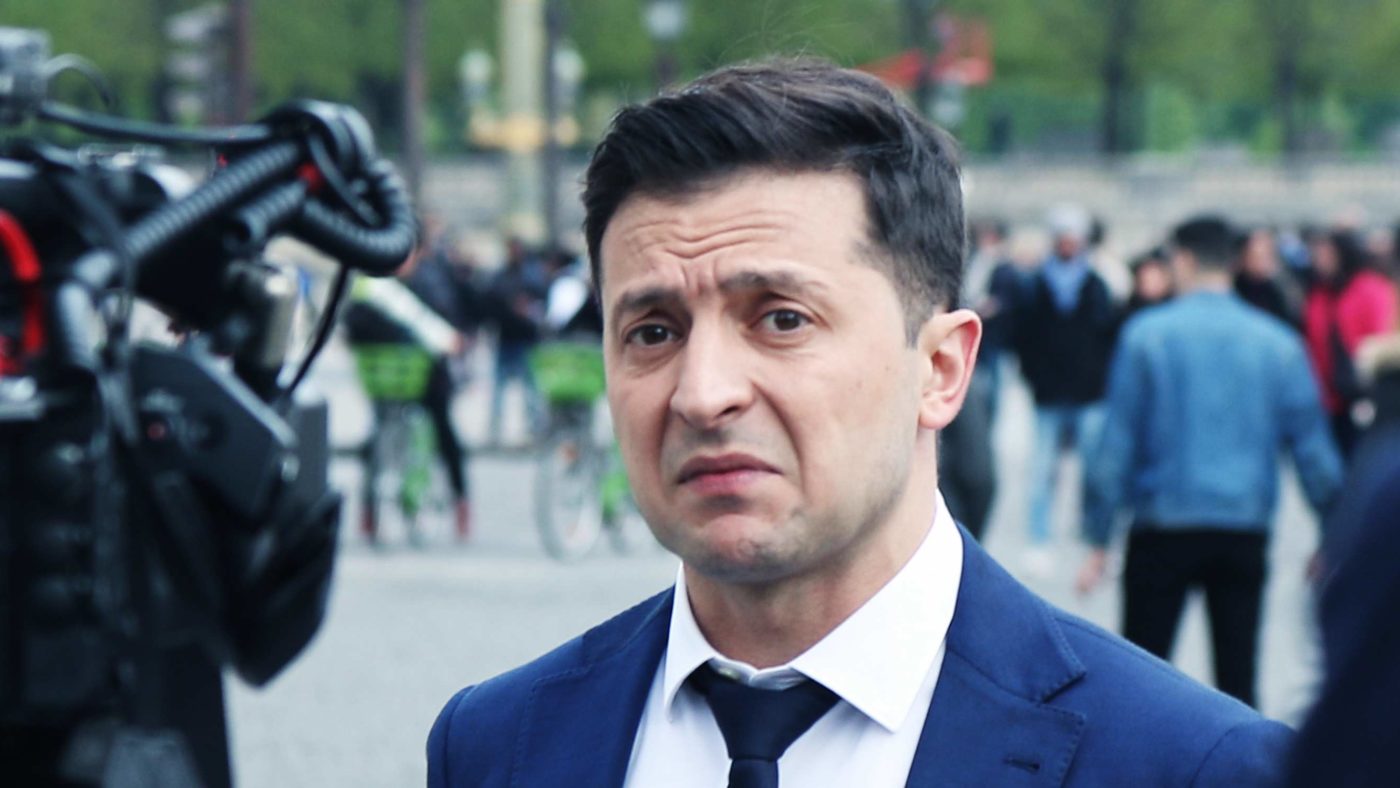Vladimir Putin awaits the outcome of Ukraine’s presidential election run-off like a betting man watching a dog fight.
On April 21, current president Petro Poroshenko will face off with a young comedian named Volodymyr Zelensky. With just days to go before the election, pro-Russian mercenaries in the Donbas region are lobbing grenades at Ukrainian troops.
Poroshenko — who won power in 2014 — stabilised Ukraine following the “Euromaidan” uprising against the corrupt government of Viktor Yanukovych and his ploy to cosy up to Russia rather than the EU. But although he has won admirers for standing up to Russia, Poroshenko has failed to reform Ukraine’s rampant corruption and has behaved like an oligarch himself.
Zelensky’s political experience amounts to playing a high-school-teacher-turned-president in a goofy television show called Servant of the People. Despite that, recent polls have given fake president Zelensky a commanding 12-point lead over actual president Poroshenko. Hedging his bets, French President Emmanuel Macron met with both the comedian and the incumbent last week in Paris.
For all the comic tone of the campaign, it’s an election which will have a decisive impact on Ukraine’s future, including including the fate of the annexed Kerch strait, Crimea, and Donbas. The incursions of recent years mean Russia now controls seven per cent of Ukraine’s territory.
The Kremlin is savvy enough not to publicly back a candidate, well aware that any hint of Russian endorsement would shred their chances of winning. Privately, however, Putin is thought to favour Zelensky, reasoning that he will be more malleable than the avowedly anti-Russian Poroshenko has shown himself to be.
This could well be a misreading, however. If elected, Zelensky might be a more troublesome leader than the Russians realise. His status as a beloved national figure, combined with his commitment to liberalisation and anti-corruption could attract foreign investment, boosting GDP and allowing Ukraine to assert its independence from Moscow. If Zelensky can push modernising reforms through parliament, he would increase the odds of support from the West the next time Putin decides to capture Ukrainian soldiers, annex territory, or supply weapons to pro-Russia separatists.
President Poroshenko’s appeal also stems from his efforts to forge a distinct path for Ukraine – a stark contrast to his predecessor, the Putin toady Yanukovych. Among Poroshenko’s flagship policies has been declaring Ukrainian the country’s only official language. During his time in office Ukraine’s Orthodox Church split with the Moscow Patriarchate, a move Poroshenko declared a sign of “spiritual independence” from Russia. His attitude to Putin has also been abrasive, questioning his legitimacy and refusing to meet with him unless the Russian leader stops arming separatists and stands down from his incursions in the Donbas.
Characteristically, Putin has not blinked, nor budged. None of President Poroshenko’s strongman ultimatums has deterred the Russian coastguard from patrolling the Kerch Strait, while displaying reckless hostility towards Ukrainian sailors in those waters. Roughly thirteen thousand Ukrainians have died in the conflicts in the five years since Putin annexed Crimea.
But the most dangerous source of civilian discontent towards Poroshenko comes not from his posturing on the international stage, but his failure to rein in corruption at home. Ukraine ranks 120th out of 180 nations in terms of public corruption, according to Transparency International, on a par with Mali, Malawi, and Liberia. Poroshenko’s only true structural reform thus far has been the establishment of the National Anti-Corruption Bureau of Ukraine. No one of note has been convicted, and the head of the Special Anti-Corruption Prosecutor’s Office has even been accused of coaching suspects on how to evade charges.
With little security for their money, investors have been understandably timid. Foreign direct investment accounts for only 2 per cent of Ukraine’s GDP, half as much as Estonia, for example. Faced with a stagnant economy, many Ukrainians have moved to countries with more attractive employment opportunities, such as Poland and the Czech Republic. Unless it can attract more investment and retain its own workforce, there is little hope for a sustained improvement in the country’s fortunes.
That is the task facing Zelensky if he triumphs in Sunday’s elections – if he actually implements his proposed structural reforms, Ukraine could yet bring in the foreign investment it so badly needs. What’s more, pressure from international business interests could make Russia’s chipping away at Ukraine’s territory considerably more difficult. Who knows, if Zelensky is really serious about tackling corruption, Ukraine could yet join the EU before its current 2030 target – a scenario which would be greeted with horror in Moscow.
With that in mind, who should Putin be most afraid of? Perhaps the Kremlin should see Zelensky not as a comedian but as a serious threat. He is smart enough to challenge the incumbent, loved enough to retain popularity (despite skipping debates), and has the policy platform to set his country on the path to prosperity. If a victorious Zelensky can put foreign money where his mouth is, the Russians won’t find him very funny at all.
CapX depends on the generosity of its readers. If you value what we do, please consider making a donation.


